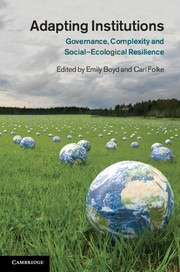Book contents
- Frontmatter
- Contents
- Illustrations
- Contributors
- Foreword
- Acknowledgements
- Acronyms and abbreviations
- 1 Adapting institutions, adaptive governance and complexity: an introduction
- Part I Adapting local institutions, networks, leadership and learning
- Part II Adapting and governing public institutions for uncertainty and complexity
- Part III Adapting multi-level institutions to environmental crisis
- Index
- References
1 - Adapting institutions, adaptive governance and complexity: an introduction
Published online by Cambridge University Press: 05 November 2011
- Frontmatter
- Contents
- Illustrations
- Contributors
- Foreword
- Acknowledgements
- Acronyms and abbreviations
- 1 Adapting institutions, adaptive governance and complexity: an introduction
- Part I Adapting local institutions, networks, leadership and learning
- Part II Adapting and governing public institutions for uncertainty and complexity
- Part III Adapting multi-level institutions to environmental crisis
- Index
- References
Summary
People shape the planet and at the same time depend on its functioning. Global environmental change is currently occurring at a rate faster than humans have ever experienced and may result in potentially devastating consequences at the planetary scale (Rockström et al. 2009). The well-being of people on the planet faces two dominant global environmental crises: climate change and the loss of the world’s ecosystem services. Following the collapse of the financial markets in 2008 the global community also faces turbulent times in terms of economic development. These crises are complex and all are interlinked (Young et al. 2006, Walker et al. 2009a). Human actions are having serious consequences on the earth’s climate system and on the capacity of landscapes and seascapes to generate important ecosystem services upon which societal development rests (Daily 1997).
We take guidance from those who argue that economic systems are not separate from ecological systems (e.g. Jansson et al. 1994). We draw on the understanding that all of the materiality of societies is inherently based on the availability of renewable resources and the capacity of the biosphere to generate and sustain those. The environment is not just an externality, but our societies are part of the biosphere, ultimately dependent on its functioning and at the same time shaping it. Such interdependence of social and ecological systems has been illustrated in many ways, from community-based and multi-level resource management (e.g. Berkes et al. 2003) to political shocks triggering shifts towards ecosystem stewardship (e.g. Gelcich et al. 2010). We acknowledge that markets cannot be decoupled from social–ecological systems, and in fact these are deeply nested concepts (Harvey 2006).
- Type
- Chapter
- Information
- Adapting InstitutionsGovernance, Complexity and Social-Ecological Resilience, pp. 1 - 8Publisher: Cambridge University PressPrint publication year: 2011
References
- 3
- Cited by

